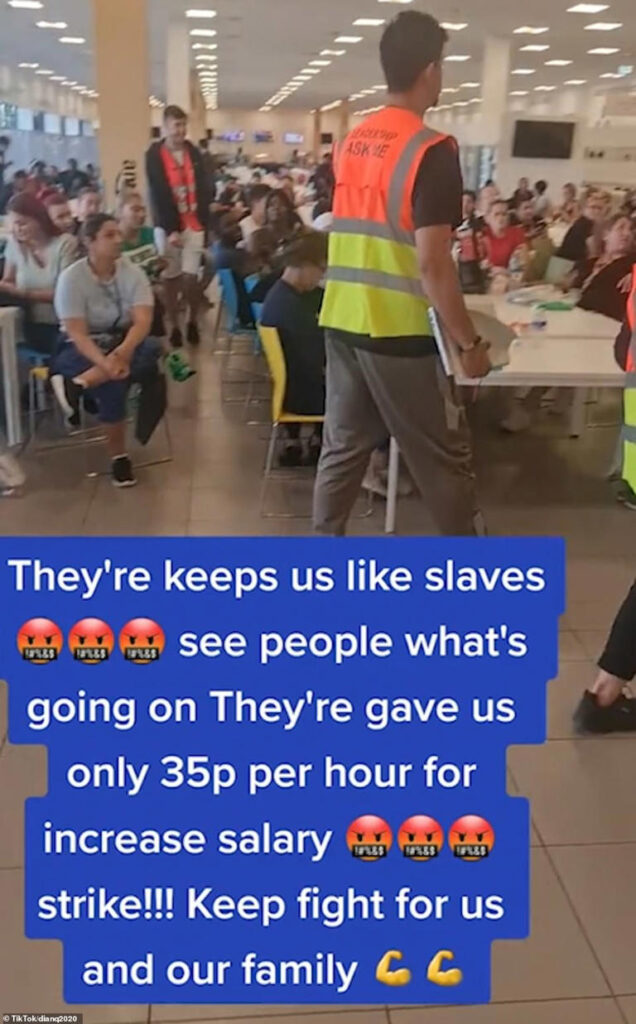by Ray Goodspeed (Leyton and Wanstead CLP)
This week, the delivery giant, Amazon, has been hit by an astonishing wave of unofficial ‘sit-down’ strikes over pay, the like of which have not been seen in this country for several decades at least.
Workers in the giant Tilbury depot, the largest in the UK (and second largest in the world) spontaneously stopped work on Wednesday (3rd August) and piled into the canteen, loudly protesting and refusing to work. The protests involved more than 700 workers. These workers were joined by hundreds more workers in Rugeley (near Birmingham) and Coventry, and some accounts suggest that as many as six Amazon centres were involved!
Amazing scenes were transmitted round the country on social media from inside the canteens. Desperate management were trying to use a mixture of warm words, trickery and threats to get the staff back to work but workers replied with derision and defiance. Suggestions from the bosses that the canteens were not safe due to overcrowding and overheating were met with sarcastic shout of “We’re fine! We’re used to it!” As the protesters carried on for many hours, they were joined by nightshift staff, and hundreds of staff were still protesting on Thursday morning and throughout the day.
Most of these workers were not organised by a trade union, and no union is recognised by the company, though the GMB, for example, has recruited some staff and their regional organiser Steve Gorelick played a role in publicising the Tilbury action on social media. Amazon are notorious for taking all possible measures to prevent union organisation, including victimising staff, threatening union organisers with trespass and blocking union-related “keywords” from the company “chat site”.
Derisory pay increase
The cause of the workers’ anger was a derisory pay increase of less than 50p an hour, for workers who are already among the worst paid in the country and who are facing the full force of the energy price rises and the general cost of living crisis which threatens to drive many workers into poverty and some even into destitution. The proposed increases in starting salary was around 3%, from £11.15 to £11.45 per hour, though some employees in particular locations would be offered only £10.50 per hour. Even so-called “third tier”, higher paid “associates” (ie workers) would only get a rise from £14.45 to £14.90.

Amazon was already known as one of the most unscrupulous employers, driving employees to stress and exhaustion, with short-term contracts, oppressive deadline targets and petty rules over toilet breaks (in enormous depots where the toilets could be as far as half a mile (800 m) away). It is one of the most profitable companies on the planet, especially during the pandemic; Amazon UK alone made £20.63 billion in revenue in 2020 yet paid only £18 million in tax. Yet, it cannot bring itself to offer a pay rise of even half the rate of inflation.
Amazon’s response to the sit-in was to threaten workers with dismissal or disciplinary action, scouring social media to see who had shared the videos of the protests. This was combined with the appearance of reasonableness, discussing with small “round table” groups in order to divide people and break the confidence that workers get from a mass meeting. The managers are heard pleading with the staff that “you have made your point and we have heard what you say, but nothing will be achieved by continuing the protest.” Though the most militant workers resisted such appeals, by Friday, most workers, partly through tiredness, were reluctantly back in work but no longer bothering to meet the strict deadline targets.
Of course, management will bide their time and, over the next few days and weeks or longer, try to intimidate staff and victimise those seen as more militant, cutting hours or terminating employment more generally. It is essential that the trade unions use these wildcat strikes to organise the workforce and build towards more systematic, planned action in the long term. The first fight, obviously, will be to resist any attempt at victimisation. In the USA, a battle is raging in several states to achieve union recognition, with the company using its vast wealth and various dirty tricks to influence workers against becoming organised. The movement in Amazon UK urgently needs to link up with US workers in a united campaign.
Unity and solidarity
But there is a danger in merely channelling the fighting spirit and fury of these workers into what can sometimes be the safe routinism of a bureaucratic trade union and precise adherence to anti-trade-union laws. These laws are certainly a threat, of course, but ultimately the strength of a campaign is in the unity, solidarity and willingness to fight of the majority of workers.
Amazon staff have now seen how, by acting together, they can bring the company to a standstill, and they will, both individually and collectively, gained a huge amount of confidence from that. They will have seen the impotence of their managers. It will not be easy to put that genie back in the bottle. Future action must be based on branches based in the workplaces and be led by the workers’ elected representatives themselves.

The official trade union movement, and the socialist left more widely, need to discuss the way forward in balancing spontaneous unofficial action such as this with official “legal” trade unionism. If the movement is united and strong enough, the anti-trade-union laws will simply not be able to be used. Once workers become fully aware of their collective power and act in a unified way, formal legal quibbles can be swept away.
Co-ordinated action
These furious protests come as part of a massive “official” strike wave, with industrial action being increasingly co-ordinated, with ASLEF (the train drivers union) and the RMT pacing the days they take action to cause more disruption with fewer actual strike days. Bus drivers in London are calling a strike to coincide with rail strikes.
Teachers and civil servants are balloting for strike action. Call centre and Open Reach workers in the Communication Workers’ Union (CWU) have a programme of strike action that has already started. All over the country refuse workers, bus drivers and others, mainly in UNITE have won concessions on pay and conditions, encouraged by a fighting leadership. At the Grangemouth oil refinery, workers may call “wildcat” unofficial strikes next week.
Such an upsurge in industrial struggles, alongside other battles such as those around climate change and rents will provide rich opportunities for the growth of socialist ideas as confidence builds. And this is only the start! Capitalism in the UK, and more widely, is moving into recession and this can only mean bigger and bigger battles over the next couple of years as workers’ fight just to retain their current living standards after a decade and a half of an almost unprecedented fall.
Capitalism can offer no way forward for ordinary working people, or for the vast majority of the population, in fact. The case for a socialist society where industry is commonly owned and planned on the basis of need and not profit will get more and more of a hearing as workers are compelled to resist in ever greater numbers.



